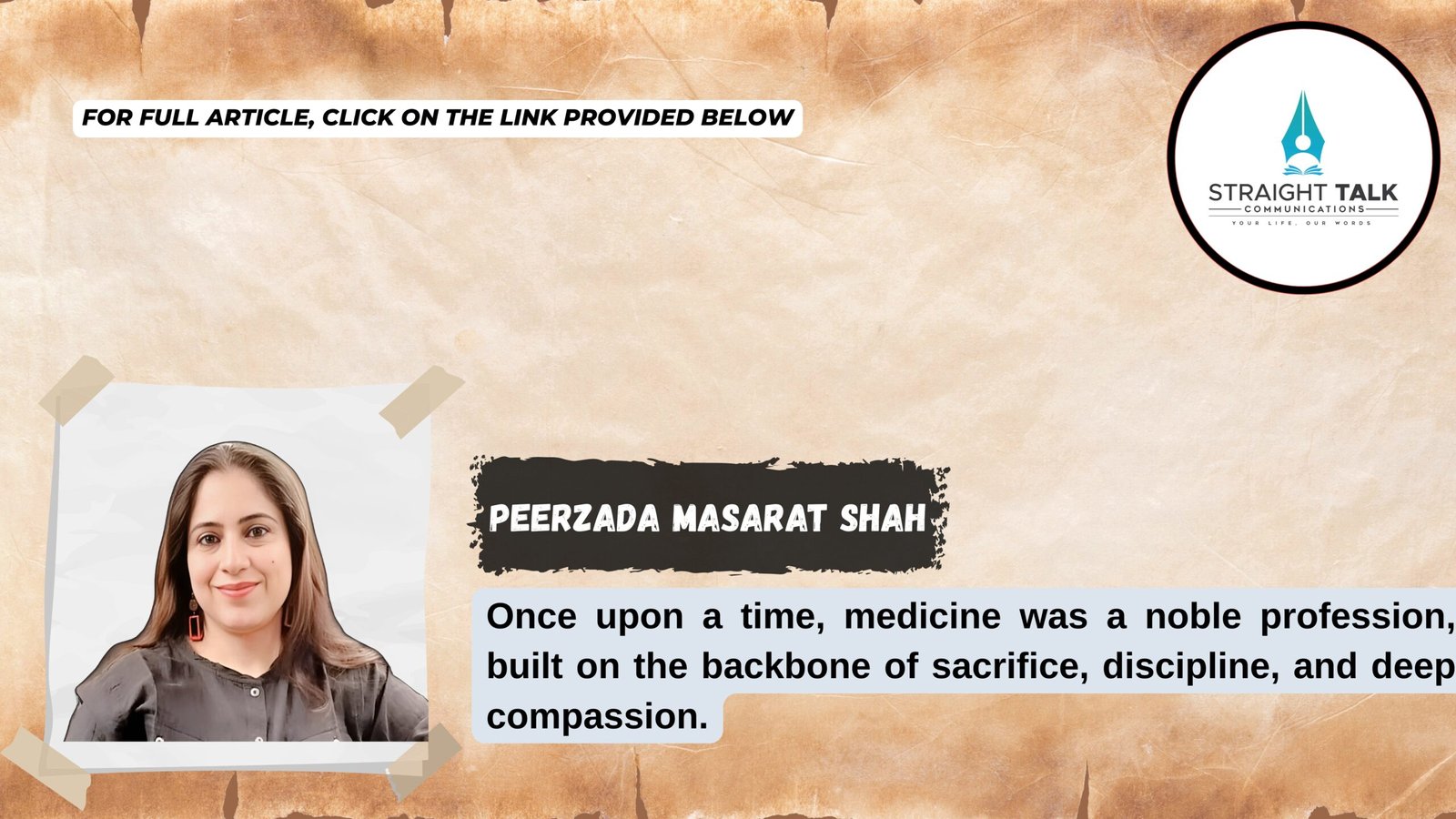The Strike Prescription: Take One Placard, Avoid All Patients

Peerzada Masarat Shah
Once upon a time, medicine was a noble profession, built on the backbone of sacrifice, discipline, and deep compassion. Today, in some hospitals, it’s beginning to look more like a battleground of egos, entitlement, and emotional meltdowns. Welcome to the new age of healthcare, where some professionals seem to have traded the Hippocratic Oath for a more emotionally flexible version: “I shall treat only when my mood permits, and if offended, I reserve the right to vanish—preferably with a slogan.”
Recently, at a government hospital, a tragedy unfolded. An emotional attendant, overwhelmed with grief, slapped a doctor—a shameful act by all standards. Assaulting a healthcare worker is a criminal offense and should never be condoned. Legal recourse must be swift, clear, and uncompromising.
But the aftermath was equally disturbing. In response, the entire medical staff went on an indefinite strike, abandoning patients mid-treatment. Emergency rooms were deserted, and the most heartbreaking image emerged: a father, cradling the dead body of his son, searching in vain for someone to help. That picture was not just of a broken family—it was a portrait of a system that is rapidly losing its soul.
When Protests Trump Patients
Let’s get one thing straight: doctors have every right to protest injustice. They deserve security, respect, and working conditions that ensure their well-being. But when did the strike become the go-to treatment plan every time a conflict arises? In what world is abandoning hundreds of patients a logical or ethical response to one man’s act of violence?
Imagine if firemen refused to put out a blaze because someone hurled an insult. Or if police officers walked away from a crime scene because a suspect shouted at them. What if teachers walked out mid-class because a parent criticized them? Society would crumble.
Doctors, like these professionals, hold the public’s trust. They don’t just work in a system—they are the system. And when they leave en masse, it’s not just a protest—it’s a collapse.
Degrees with a Price Tag, Compassion Not Included
To make matters worse, there’s another elephant in the room we conveniently tiptoe around: the quality of some doctors emerging from certain private medical colleges. Where money flows, ethics sometimes ebb. Capitation fees are paid, degrees are awarded, and out come professionals who may know their textbooks but forgot to pack empathy in their doctor’s kit.
Increasingly, patients are treated as irritants, not individuals. Ask a question, and you’re dismissed. Question a delay, and you’re met with hostility. Request accountability, and you’re accused of harassment.
It’s a tragic irony—those who are trained to heal now often trigger fear. Patients whisper complaints in corridors instead of voicing them out loud, afraid of retaliation. Instead of walking into hospitals for treatment, they tiptoe around inflated egos.
And yet, India is also home to extraordinary doctors—brilliant, humble, resilient individuals who serve in the most trying circumstances with unmatched dedication. But even their reputation is tainted when a handful of others act like VIPs rather than caregivers.
Administrators or Bystanders?
In times of crisis, the responsibility doesn’t just lie with the doctors on the floor. What about hospital administrators? What about the medical superintendents and deans, who are supposed to take swift action, file police complaints, demand protection, and keep the system running?
Instead, they often act like helpless spectators—clapping along as walkouts are staged and wards go silent. It’s almost as if they’ve confused a healthcare institution with a college campus protest. What’s missing is leadership, backbone, and most of all, moral clarity.
Should a whole hospital shut down because one doctor was assaulted? No. That’s not justice. That’s collateral damage, and it’s the patients who pay the price—every single time.
Compassion on Leave
Every time a doctor chooses to walk away from a patient in pain because they’re “offended,” something sacred is lost. Every time a hospital shuts down its services over a scuffle, the spirit of medicine dims a little more.
The profession demands more than just academic brilliance. It calls for courage, emotional maturity, and above all, a willingness to serve those who are at their worst moments—even when they’re angry, irrational, or grieving.
If a doctor can only function under perfect conditions, perhaps medicine wasn’t the right calling.
A New Oath?
Maybe it’s time to issue a fresh pledge to new entrants in medical colleges. Something like:
“I promise to treat patients, unless I’m irritated.
I will prioritize care, unless I feel disrespected.
I will uphold human life, but only after my self-esteem has been comforted.”
Of course, that’s sarcasm. But the situation itself is no joke. This is not just about policy or protocol—it’s about people. Real lives. Real tragedies. And a real crisis of conscience.
A man carrying his son’s lifeless body through empty corridors isn’t a “side effect” of a protest—it’s the central symptom of a failing system.
We must not normalize this.
Final Dose
Doctors deserve dignity. Patients deserve compassion. And society deserves better than a healthcare system that crashes at the first sign of tension.
It’s time to remind ourselves what medicine truly stands for—not just treatment, but mercy. Not just knowledge, but humanity. And right now, both seem to be on strike.







